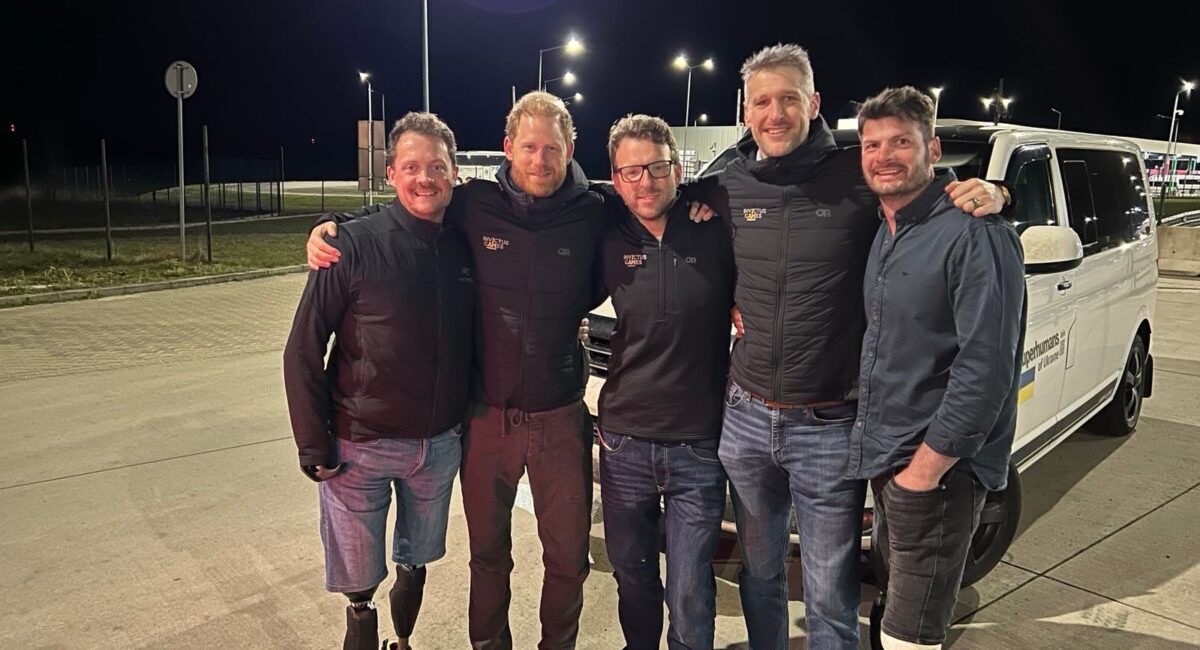There are places in the world that stay with you. Places that challenge you emotionally, physically—even spiritually. Places that, despite the pain and suffering they house, radiate an undeniable strength. Recently, I visited one of those places: the Superhumans Centre in Lviv, Ukraine.
I had the honour of joining our Patron Prince Harry, The Duke of Sussex, and a small team from the Invictus Games Foundation, including three other veterans, on a visit that had been in the works for some time. The Duke had been invited by Olga Rudneva, CEO of Superhumans, following an IGF visit to Ukraine last year—and again more recently at the Invictus Games Vancouver Whistler 2025.
The purpose of the trip was clear: to witness how world-class rehabilitation and holistic care are being delivered in a country still living through war, shine a spotlight on recovery and look for opportunities for future collaboration to keep reinforcing the value of rehabilitation through sports and to keep changing attitudes towards people living with disability.
What we saw was nothing short of extraordinary.
Superhumans is not just a medical facility. It’s a beacon—a place that offers prosthetics, reconstructive surgery, psychological support, and rehabilitation free of charge to those whose lives have been upended by conflict. But more than that, it’s a community. And that community hums with energy, pride, and unshakable resolve.
It’s also an emotionally charged place— I found it physically and psychologically tiring to walk through. I can only pay the utmost respect to the men and women who work there every single day. The emotions that hit you range from despair to hope—despair for the pain endured, and all-consuming hope for the future, driven by the resilience and tenacity that radiated from every room and down every corridor.
The four of us that joined Prince Harry on the visit all carry wounds from Afghanistan and therefore it brought back powerful and vivid memories of the years we spent rotating in and out of DMRC Headley Court. Alongside the stark injuries carried by those we met – missing limbs, missing eyes, burns and scars - were smiles, banter and high fives as a mate celebrates another taking their first steps on new prosthetic limbs—it was all there. Familiar. Raw. Real.
But this visit wasn’t just a personal journey—it was also a moment of realisation: that the Invictus Games Foundation has fundamentally changed the way recovery is approached in Ukraine.
When Ukraine first joined the Invictus Games community in readiness for the Invictus Games Toronto 2017, sports recovery was a new concept. Today, it’s a cornerstone of their Veteran Policy Strategy. The Minister for Veterans Affairs, Natalyia Kalmykova, told us that it’s because of Invictus that they understand the vital role of sport for recovery in Ukraine.
Now, sport is enshrined in their national strategy as a key element of veterans’ healthcare. In the past month alone, over 22,000 veterans accessed benefits like gym memberships and pool passes. It’s not just policy—it’s practice. And it’s changing lives.
We also learned about STRATCOM’s plans to decentralise sports recovery efforts in 2025, expanding to 12 different regions. This means broader access, more local clubs, and previous Invictus Games competitors acting as champions to drive engagement. It’s exactly the kind of grassroots, peer-led initiative that embodies the Invictus Spirit.
Alongside this, the Come Back Alive Foundation is conducting a national mapping study to identify recovery opportunities across the country. The outcome will be an interactive database, helping veterans connect with activities near them—making recovery more accessible, more visible, and more inclusive. I am delighted that the Invictus Games Foundation is supporting the CBA Foundation with a Domestic Grant to support the delivery of sport recovery events and equipment.
What really struck me is how far Ukraine has come in such a short time. The attitudes to disability and mental health have shifted radically. Veterans are not only respected—they’re celebrated. The government is even developing a transition process, including awards for veteran-friendly businesses and recognition of veterans’ roles in national defence and resilience.
This progress is not coincidental—it’s the direct result of shared experience, international collaboration, and a belief in recovery through community and sport.
The Invictus Games Foundation's work isn’t just about the Games. It’s about what comes after. It’s about work beyond and between the Games that helps people rediscover who they are after trauma. It’s about turning pain into pride and wounds into wisdom. And in Ukraine, that vision is being realised in a very real, very powerful way.
To walk through the Superhumans Centre is to witness that transformation happening in real time. And to walk through it alongside old friends—fellow veterans, fellow survivors—was a reminder that we never truly recover alone.
By David Wiseman, Chief International Programmes & Strategic Lead, Invictus Games Foundation
